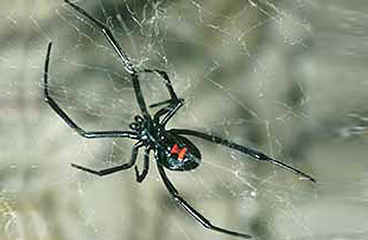
Overview
After being bitten by a black widow spider, you may have painful swelling around the bite. You may also notice cramps, muscle spasms, and achiness, and you may be sick to your stomach.
These symptoms may get worse for up to about 12 hours after you were bitten. Then they should start to go away. It may take a few days or weeks before all the pain goes away.
Black widow spiders are usually found throughout the United States, Mexico, and southern Canada. They live in low-lying webs in garages, in barbecue grills, around swimming pools, and in wood piles. Most bites occur in rural and suburban areas between the months of April and October. These spiders tend to bite when their webs are disturbed. Bites to babies and children may be more serious than bites to adults.
Medicine to counteract black widow spider venom (antivenom) is available, but it is rarely used.
Follow-up care is a key part of your treatment and safety. Be sure to make and go to all appointments, and call your doctor if you are having problems. It's also a good idea to know your test results and keep a list of the medicines you take.
How can you care for yourself at home?
- If the doctor gave you a prescription medicine for pain, take it as prescribed.
- Take an over-the-counter antihistamine, such as fexofenadine (Allegra) or loratadine (Claritin), to calm the itching and reduce the swelling. Read and follow all instructions on the label.
- Put ice or a cold pack on the bite for 10 to 20 minutes at a time. Put a thin cloth between the ice and your skin.
- If your doctor told you how to care for the bite, follow your doctor's instructions. If you did not get instructions, follow this general advice:
- Wash the bite area with clean water 2 times a day. Don't use hydrogen peroxide or alcohol, which can slow healing.
- You may cover the bite with a thin layer of petroleum jelly, such as Vaseline, and a nonstick bandage.
- Apply more petroleum jelly and replace the bandage as needed.
When should you call for help?
Call 911 anytime you think you may need emergency care. For example, call if:
- You passed out (lost consciousness).
- You have severe trouble breathing.
Call your doctor now or seek immediate medical care if:
- You are dizzy or lightheaded, or you feel like you may faint.
- You have new symptoms, such as:
- Abdominal cramping.
- Vomiting.
- Severe pain.
- Headache.
- You have symptoms of infection, such as:
- Increased pain, swelling, warmth, or redness.
- Red streaks leading from the area.
- Pus draining from the area.
- A fever.
Watch closely for changes in your health, and be sure to contact your doctor if:
- You have new or worse pain at the bite area.
- You do not get better as expected.
Where can you learn more?
Go to http://www.healthwise.net/patientEd
Enter X822 in the search box to learn more about "Black Widow Spider Bite: Care Instructions".
Current as of: October 1, 2025
Author: Ignite Healthwise, LLC Staff
Clinical Review Board
All Ignite Healthwise, LLC education is reviewed by a team that includes physicians, nurses, advanced practitioners, registered dieticians, and other healthcare professionals.

